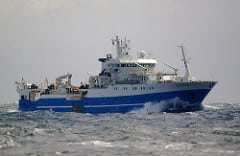Marine
Report on UK Public Sector Research Vessels published
February 10, 2016 by Marine Scotland Communications 1 Comment | Category Collaborations, Marine Directorate Science, Research Vessel Surveys
 A report looking at the current fleet of UK Public Sector Research Vessels has been published. The report has been put together on behalf of the Marine Science Co-ordination Committee’s (MSCC) Research Vessel Working Group, who ensure that we get maximum value from the research vessels through collaboration and cooperation. By working together, the UK gains £4.5M worth of additional scientific work that would not be possible if each organisation was working in isolation.
A report looking at the current fleet of UK Public Sector Research Vessels has been published. The report has been put together on behalf of the Marine Science Co-ordination Committee’s (MSCC) Research Vessel Working Group, who ensure that we get maximum value from the research vessels through collaboration and cooperation. By working together, the UK gains £4.5M worth of additional scientific work that would not be possible if each organisation was working in isolation.
The fleet of seven vessels can be divided into three groups:
Shelf Seas – three vessels are operated around the UK coast with the primary purpose of conducting fishery stock assessment and environmental monitoring for UK Government and Devolved Administration departments:
- RV Corystes operated by the Agri-Food and Biosciences Institute (AFBI)
- MRV Scotia operated by Marine Scotland
- Cefas Endeavour operated by the Centre for Environment, Fisheries and Aquaculture Science (Cefas)
Polar research and logistics vessels operated by British Antarctic Survey for the Natural Environment Research Council (NERC) on behalf of the Department for Business, Innovation and Skills (BIS). These vessels operate primarily in the Antarctic, with some work in the Arctic. The UK Government announced during 2014 that it would replace these two vessels with a single new polar research vessel, due in service in 2019:
- RRS James Clark Ross
- RRS Ernest Shackleton
Multidisciplinary ocean-going research vessels operated by the National Oceanography Centre (NOC) for the NERC on behalf of BIS. These vessels operate worldwide supporting Blue Skies, thematic and strategic marine scientific research undertaken by the UK academic community:
- RRS James Cook
- RRS Discovery
More Information
- Read the full report: UK Public Sector Research Vessels
-
Read the associated report: UK Marine Research Vessels – An assessment and proposals for improved co-ordination
- Marine Science Co-ordination Committee’s (MSCC) Research Vessel Working Group


Environmental Monitoring is very important to understand whether quality of environmental is getting better or worse. Environmental monitoring is closely related to scientific research.